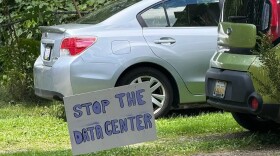Michigan is becoming a battleground for data centers — and the public debate is full of unfamiliar technical terms. As communities weigh projects in Lansing, Saline Township, Howell Township, Ypsilanti Township and beyond, residents have questions about energy use, water demand, cooling systems, tax incentives and long-term environmental impacts.
To help cut through the noise, WKAR News created this glossary. It explains the core concepts — in plain English — and links to our reporting throughout the week-long series, “Michigan’s Data Center Divide.”
Data Center
A facility that stores and processes digital information — everything from emails to streaming video to AI tools.
Related coverage: “Your guide to Michigan’s data center boom — and the growing backlash.”
Hyperscale Data Center
A very large data center designed for massive computing demand. These centers can require millions of gallons of water per day and bring heavy energy use. Michigan’s first hyperscale facilities are proposed in Saline Township.
Related coverage: “Your guide to Michigan’s data center boom — and the growing backlash.”
Closed-Loop Cooling
A cooling system that recirculates water instead of evaporating it. Deep Green proposes using this in Lansing, dramatically reducing water consumption compared to conventional cooling.
Related coverage: “Why a global data center company is eyeing Michigan — and why it chose Lansing first.”
Evaporative Cooling
A traditional cooling method where water is used once and then evaporates. Many hyperscale centers rely on this, which contributes to high daily water use.
Related coverage: “Your guide to Michigan’s data center boom — and the growing backlash.”
Heat Loop / Thermal Loop
The system of underground pipes that circulates hot water to heat downtown buildings. Deep Green proposes giving excess heat from its Lansing data center to the Lansing Board of Water & Light.
Related coverage: “Why a global data center company is eyeing Michigan — and why it chose Lansing first.”
Peak Load / Grid Capacity
The maximum amount of electricity needed on the highest-demand days each year. Utilities must be able to meet this threshold before approving new projects.
Related coverage: “Why a global data center company is eyeing Michigan — and why it chose Lansing first.”
Municipal Water System
City-controlled drinking water and wastewater infrastructure. In Michigan, data centers must connect to municipal systems to receive tax incentives — giving EGLE oversight of water use.
Related coverage: “Your guide to Michigan’s data center boom — and the growing backlash.”
Michigan Sales & Use Tax Exemptions
State incentives passed in 2024 allowing data centers and some suppliers to avoid certain sales and use taxes. Designed to attract investment but criticized by some residents.
Related coverage: “Your guide to Michigan’s data center boom — and the growing backlash.”
Greenwashing
When a company markets its product or facility as more environmentally friendly than it actually is. Some Lansing residents have used this term when reacting to Deep Green’s proposal.
Related coverage: “Why a global data center company is eyeing Michigan — and why it chose Lansing first.”
Water Use (Daily Consumption)
The amount of water required to cool data center servers. Hyperscale centers can use 1–5 million gallons per day depending on their cooling system.
Related coverage: “Your guide to Michigan’s data center boom — and the growing backlash.”
Noise Levels
Data centers can generate noise inside up to 90–96 decibels — louder than a lawnmower — with some external noise audible from nearby neighborhoods depending on design and setbacks.
Related coverage: “Your guide to Michigan’s data center boom — and the growing backlash.”
AI Compute / High-Performance Computing (HPC)
Intensive computing tasks associated with artificial intelligence, academic research or large-scale data processing. Deep Green says its Lansing site is built for this.
Related coverage: “Why a global data center company is eyeing Michigan — and why it chose Lansing first.”
Economic Impact / Tax Base
The projected tax revenue and job creation associated with a proposed data center. In Howell Township, one company would become the county’s single largest taxpayer.
Related coverage: “Howell Township to hold hearing on data center project.”
Environmental Concerns
Issues raised by residents, including groundwater draw, farmland loss, emissions, and long-term sustainability.
Related coverage: “Michigan Data Centers: Inside the debate over energy, land and transparency.”
Transparency
Public calls for clear communication about energy usage, water demand, environmental impact, and long-term plans. A recurring concern across Mid-Michigan communities.
Related coverage: “Michigan Data Centers: Inside the debate over energy, land and transparency.”
Community Engagement
The expectation that developers and local governments share plans publicly, hold hearings and explain impacts before approval.
Related coverage: “Lansing delays vote on downtown data center planned within city limits.”
Ratepayer Impact / Utility Rates
How new data centers may influence electricity bills. Some utilities argue these projects expand the customer base and reduce pressure on rates; others warn of long-term costs.
Related coverage: “Michigan Data Centers: Inside the debate over energy, land and transparency.”
Land Use and Zoning
Local government decisions on how land can be developed, including hearings, approvals, and environmental reviews.
Related coverage: “Lansing delays vote on downtown data center planned within city limits.”







